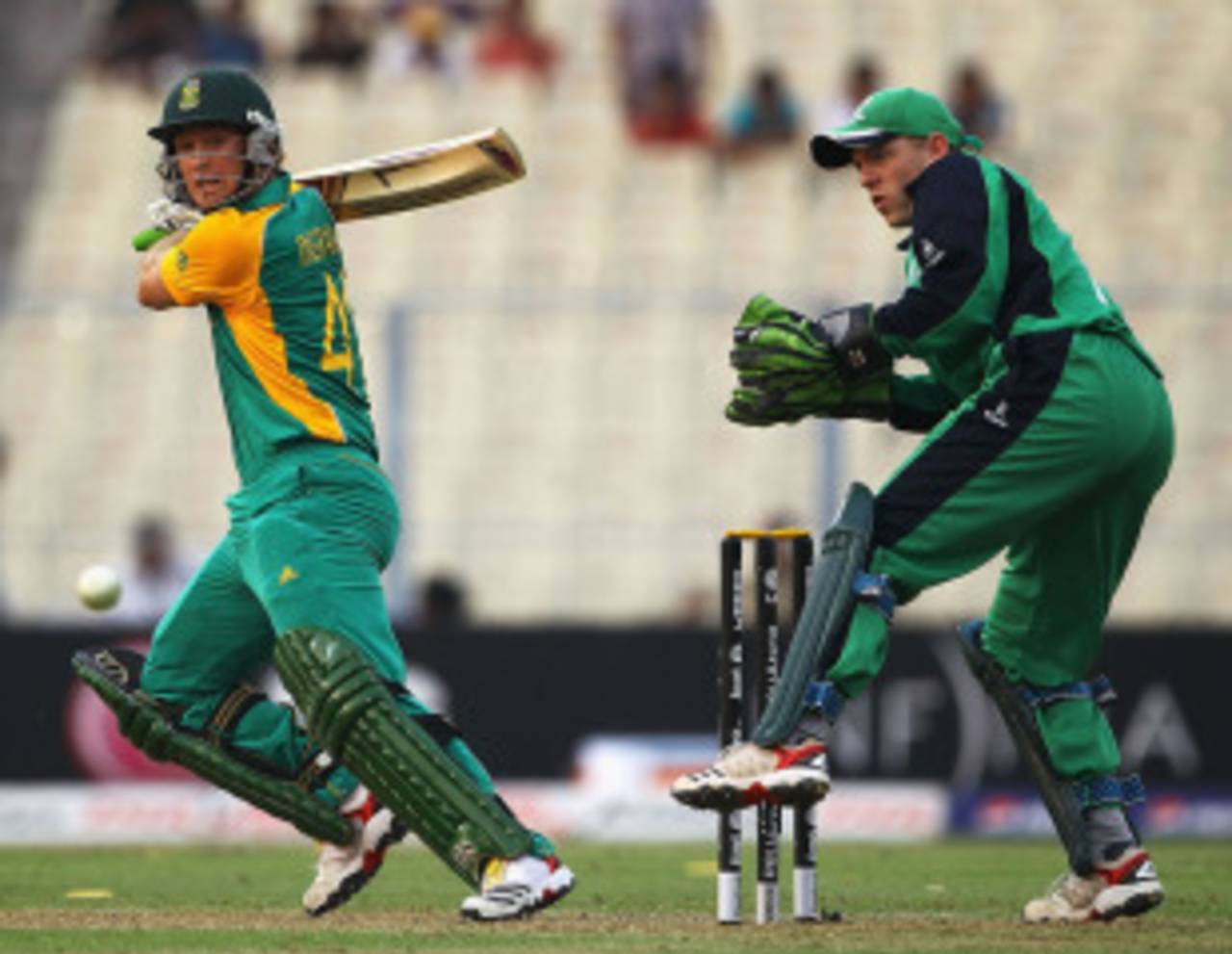A win over Ireland, however clinical it may be, is probably not one of the items you will see on a list of things to do to learn how to deal with pressure. As respectable and feisty as they are, if it's not their day, it's not their day, and playing against them can become like an extended practice session.
It could turn passionate men into robots, methodically going through the motions until the inevitable conclusion is reached. It could mean that some of their senses are dulled, their reactions are less sharp and their effort is being saved for later on. It could result in them being caught off guard, letting it slip somewhere and turning what should be training into a tense contest, unnecessarily.
For the first 27 overs of the match, that was South Africa. Hashim Amla was dismissed after a well-judged catch by George Dockrell, attempting to upper-cut and not hitting the ball hard enough. Morne van Wyk was dropped twice and that must have ruffled him, because he called for a single that ran out
Graeme Smith. In an attempt at redemption, van Wyk blazed for a while and then was then defeated by a good ball that kept low. Jacques Kallis was caught dawdling and Faf du Plessis re-enacted the perfect way to be caught at slip.
South Africa were in a precarious position at 117 for 5 that could easily have become 170 all out. Only a delicate toasting of a middle order that was as soft as a marshmallow in the match
against England and an entire ODI series against India could prevent it. It was a situation that a team unprepared for a brush with tension would have let get out of control. South Africa are desperate to show that they are no longer that team.
"Even though we were under pressure, we still managed to keep the run-rate up and I thought
Colin [Ingram] did fantastically well coming in," Smith, the South Africa captain, said. Ingram and
JP Duminy, who is considered the marshal of the middle order, put on 87 for the sixth wicket at more than a run a ball, and knocked the wind out of the Ireland bowlers' sails.
What was particularly impressive was the way Ingram handled the pressure despite the fact it was his first outing in this tournament. Drafted into the side because of an injury to AB de Villiers, Ingram had to slot into a position, the No. 7 slot, that he had been in only once for the national side before the game. Ingram has most often been used at No. 3, in the absence of Jacques Kallis, and there had been looming question marks over his ability to change roles.
Ingram had a lot to prove, and having not had an opportunity in the tournament yet, his hunger was evident, and, to an extent, all-consuming. It overtook the pressure of the situation because Ingram made it more about his own contest with the bowlers. It was a battle all the way, but one that Ingram can walk away from knowing he gave his all. "He was feeling a bit down with a stomach bug, so it was good to see him fight as well as he did," Duminy said.
Duminy too had a score to settle with critics wanting more from him as a senior player in the middle order. His two one-day centuries have come against Zimbabwe, and even though his 99 on Tuesday was also against a smaller team, the circumstances meant that, had he got the extra run, the ton would have been higher ranked than the previous two.
Perhaps the calls for Duminy to play an innings of authority stemmed from the fact that he has not been tested enough in tough situations, but he showed that when the occasion arises for him to do so, he is capable.
He fell short of a century playing a glory shot, but said that the hundred wasn't on his mind as much as the wellbeing of the team was. "I was thinking of getting as many as we could. You never quite know what's a good enough score and one or two runs can make a difference." Nonetheless he rates the innings as "one of the better ones" of his career thus far.
While Ingram and Duminy were involved in their personal combats, the pressure dissipated and the two had played South Africa into a comfortable position. It was the second time that the middle order had come through for the team, the first being against India last Saturday, and it's all part of how the squad is learning to cope with pressure. The match against India also saw them put out a massive fire, that time with the ball. With India looking set for a score in excess of 350, it was up to the likes of Johan Botha, Robin Peterson and Dale Steyn to come through under pressure.
South African cricket and pressure will always be linked until they win a major trophy, but the strides they are taking towards ensuring they are ready to do that cannot go unnoticed. In each of their last two matches, they've been faced with a potential pressure cooker and both times, they've let out the stopper and been in control of the situation. It's all part of a plan that South Africa hope to be able to execute in the knockout stages, which is why it's not important who they manage to achieve it against now; what's vital is that they do manage, and so far, they have.
Firdose Moonda is ESPNcricinfo's South Africa correspondent
